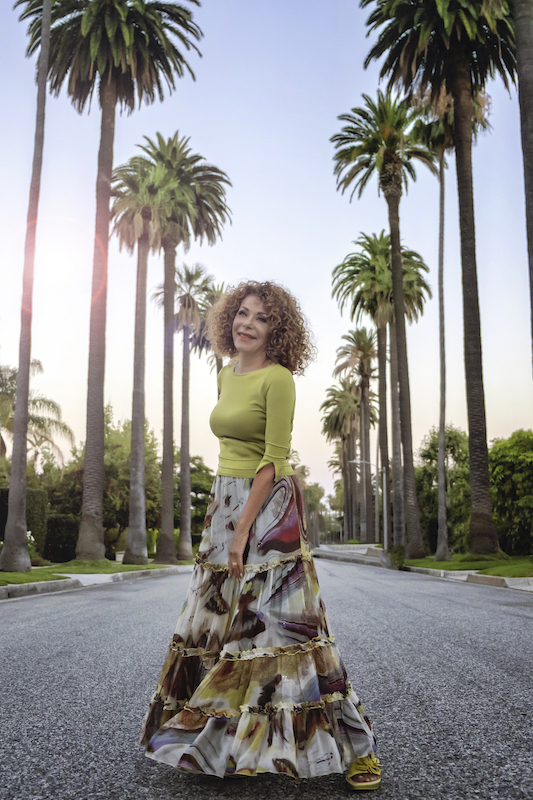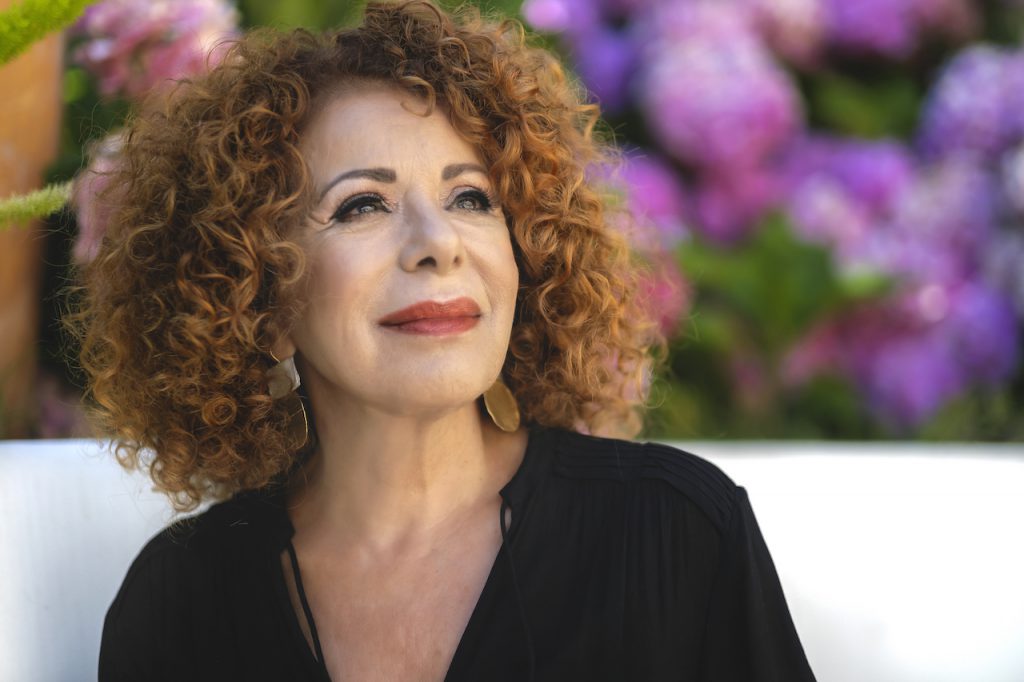
Hedva Amrani is a legendary Israeli singer. Her international big hit Naomi No Yume(I Dream of Naomi) won the 1st YAMAHA international music festival in 1970 under the duo Hedva & David. Many Japanese people still remember the song. This year, Hedva made a big comeback with her new single Ikiteko. In this exclusive interview, we asked her about the story behind her new single, her experiences in Japan and her messages to Japanese fans.
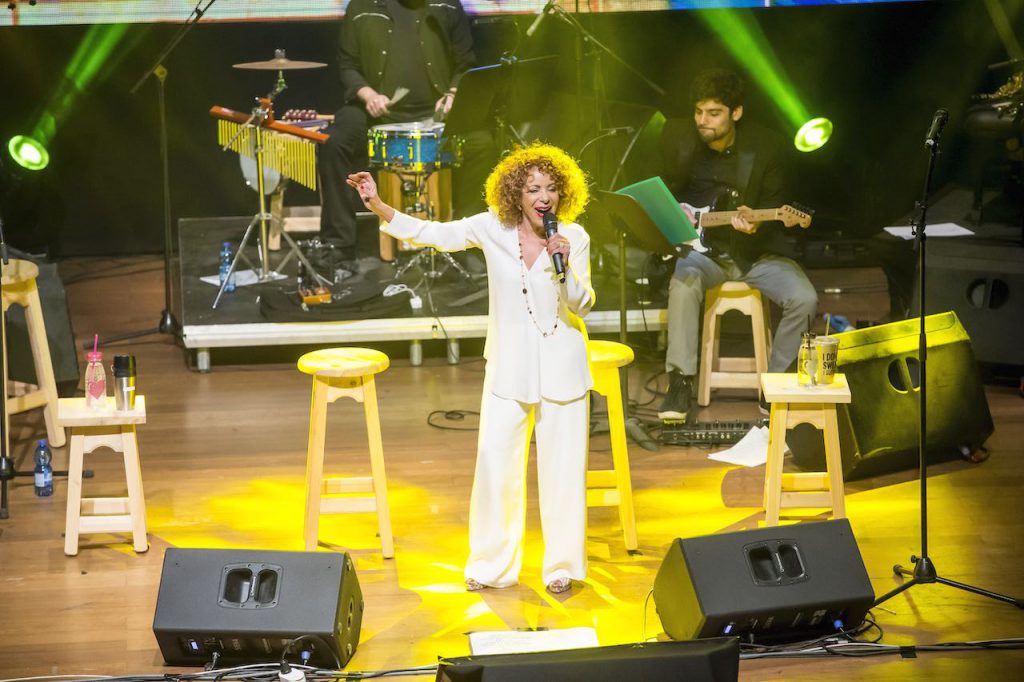
――― It has been almost 50 years since you last released a song in Japan. What made you decide to release a song?
Hedva: A few years ago, I had a very successful release of the song “Just Be” that became #1 hit in Israel. All of the popular radio stations played it, as well as the most important radio station Galgaltz which is geared mostly to very young people. It’s a military radio station run by the soldiers who are at age 18,19, 20. All they play is top Israeli and international contemporary music. I was so happy that they chose to play my song and moved it up to top of the chart. The song became highly accepted by the general public as well, and I was so excited for this achievement. Mostly because over the years, I kept releasing new songs but for some reason I didn’t have a real hit for maybe 10 years.
I loved the music and the message of this song. I thought It had this beautiful feeling that reminded me of the sound of the 70’s but with a contemporary arrangement. I discussed it with my manager, and we both agreed that this song could be fantastic for Japan. So we decided to give it a try. We started by connecting with the Japanese consulate in Israel which led us to the Israeli council in Japan who introduced us to a few people and of course, that led us to SivanS!
SivanS is a communication agency that runs this ISRAERU web magazine and also supported the release of Hedva's new song in Japan.
Anyway we gave it a try, and look what happened. We made history when we won the YAMAHA international music festival with Naomi No Yume. It’s so beautiful and I’m so excited!
――― The original song in Hebrew is titled “Just be” in English, but why did you make the Japanese title “Ikiteko (Direct meaning : Let’s live)”? What was your thought and message behind it?
Hedva ー Actually the English translation was wrong, it really means “simply be” meaning “live it”. When Kuniko Cohen did the Japanese translation, she did the right thing. The song title in Hebrew is “Pashut Liheyot” and it means “just live what’s there for you in life” and that’s the meaning of the song. The message is to enjoy the simplest things in the day; you wake up and the sun is shining when you start your day. When you’re driving and the driver next to you lets you go first to drive past him without honking, and when you see a child running into his mother’s arms with so much love..all the positive things in life. Think of the good things in life and forget about the misery and unappreciated of what life is. Life is beautiful if you make it so.
This is really the message of the song. I also say this message to people, to love and to give others what you expect from them. Just be positive and happy! I think Kuniko, the Japanese lyricist, did an amazing job translating the lyrics. It’s beautiful. I saw each line she wrote with the (Hebrew) translation and she really got it! And she picked up the right ringing words that rhyme so beautifully and have nice lively sounds. I really love it.
――― That is wonderful. Coincidentally, Ms. Kuniko is actually also one of the writers on ISRAERU! Anyway, you said earlier that your new song has a 70’s but modern sound and it really reminds us of a Japanese traditional pop song. Is it a common sound in Israel?
Hedva ー Not really, but I tell you what it reminds me of. You know about the Eurovision Song Festival, right? The Eurovision is very popular in Israel and there are songs that are more European than American. This song has that kind of feeling. I recorded 3 songs to submit to Eurovision..and I almost made it by only 1 vote. So I wanted to keep the same sound because there is a big crowd of my fans that love the Eurovision Song Festival.
――― That is interesting. What was the reaction of your Israeli fans towards the original Hebew song?
Hedva ー They loved it! Like I told you it became a #1 hit. And when they heard it in Japanese, they liked that too! I posted it(Japanese version) on social media and I got a lot of nice comments from my friends and fans.
――― You received a lot of good comments and reactions from your Japanese fans as well. You sing in Japanese beautifully even if it’s not your native language. What do you find difficult when you sing in a different language? And how do you learn and practice?
Hedva: I have to tell you that after singing at the YAMAHA festival, we had to learn the song in Japanese in only 24 hours. The sound of Japanese is very similar to Hebrew, believe it or not. We both have very open vowels, you have the words “Anata”, “Sakana” and “Ima”..and of course you have “Naomi”! They all have meanings in Hebrew, for example, “Ima” in Hebrew means “mother”. “Sakana” is fish in Japanese, right? But it means “danger” in Hebrew. Many words have the same sounds..so Japanese sounds are easy for me to imitate. The first time when we were recording in Japan back in the 70’s, the producer said that the Beatles tried, and Elvis tried but they couldn’t get the pronunciation right. And when we recorded Naomi No Yume in Japanese, some people did not know that we were not Japanese until of course they saw us on the television.
Anyway, it is still not easy to memorize the Japanese lyrics. I have to work hard to get them right. I relate the sound of the Japanese word to something that I know either in Hebrew or English. If I say “Ikiteko”, “I” and “ki” is something in Hebrew, and “teko” is something like “take it” or “Take out” in English. I start with one word then move onto second and third, repeat and repeat and then it becomes a sentence. I take the lyrics with me everywhere I go when I’m learning. I even take it to my bed and in the middle of the night, I wake up and memorize a few words. Also when I take a walk and when I eat my breakfast..and the most of all, when I’m swimming. I swim everyday and I repeat the sentences while I’m swimming. I don’t usually put my head in the water, I do breaststroke and backstroke with my head out.
I wanna work on more Japanese songs because if I can come to Japan and perform, I want to have 6 or 7 songs that I can sing fluently in Japanese. Now I have 4 so let’s see how many more I can learn. I can sing Ikiteko, Naomi No Yume and also Salam Alekum(Inori) which we haven’t released yet, and other Israeli songs that I recorded in Japanese.
――― You visited Japan back in 2015 to perform NAOMI NO YUME for NHK concert together with Keisuke Yamauchi, a young Japanese folk singer. Do you have any other Japanese artists you’d like to collaborate with, and why?
Hedva ー I was very flattered by Crazy Ken Band when they covered my song. It'd be so cool to collaborate with them. And I was thinking it would be nice to do it with Yuji Kubota(Shamisen Player) and of course Keisuke Yamauchi. But what I really wanna do is to collaborate with one of the younger artists from the Japanese top chart. My motivation now is to reach the younger people. I really want the younger audience to listen to my music and enjoy it.
――― Do you have any good memories in Japan that you cherish? From your first visit in 1970 up till your most recent visit.
Hedva ー Ah there are so many! The first thing I saw was how clean and neat things were, and also how polite the people are. They really make sure that you are comfortable, that you are pleased. If you go on the street and ask for directions, a Japanese person would not just tell you “oh, just go straight and left and right” but a Japanese person would go with you to make sure you get there. It’s amazing! It’s not like this in the western world.
Then I’d never forget the taxi drivers. The drivers always wore white gloves! And I remember at Mitsukoshi, the first department store in Tokyo that I went to, I saw a nice pretty girl in front of the escalator wearing a mask on her face already in 1970, and she was wiping the handrail before you put your hand on it. I never saw this anywhere else. Maybe in some of the places today due to the coronavirus.
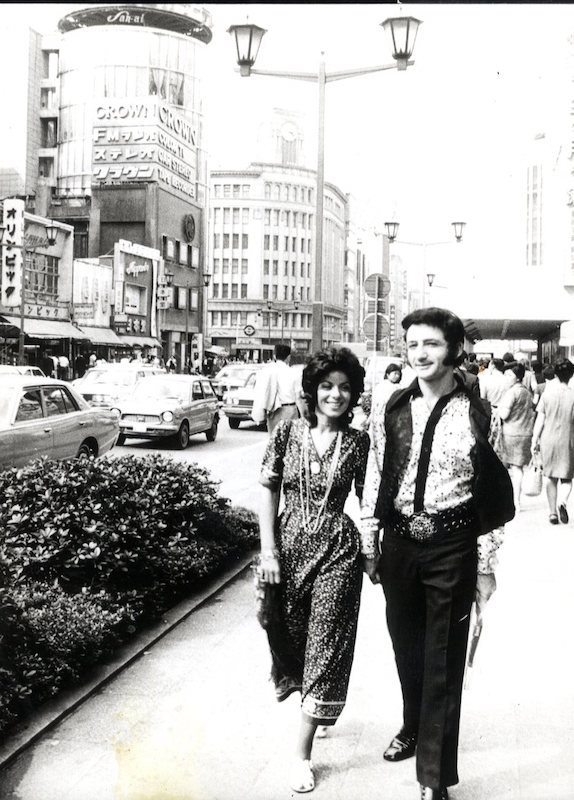
I also love the food..although it took time for me to adjust to Sushi but later on I became crazy for it. I love the temples, I love the spiritual things about Japanese culture. Oh and the Japanese gardens. My husband and I fell in love with Koi fish, we have a garden here and a huge fish pond like 40 feet and we have Koi fish there.
When I went back to Japan 5 years ago, I was shocked by all the new modern buildings and architecture. That was something. I went to Kyoto and I really loved it. Kyoto is like Jerusalem. Our Jerusalem is holy and Kyoto for me is holy. I also went to 5 Art Islands; Naoshima and others. They were amazing! What they did is, they turned a small village into a museum. People’s homes and gardens, the landscapes and fields, the whole village became art. And we stayed in a hotel which was a museum itself on Naoshima island. We had the best time there.
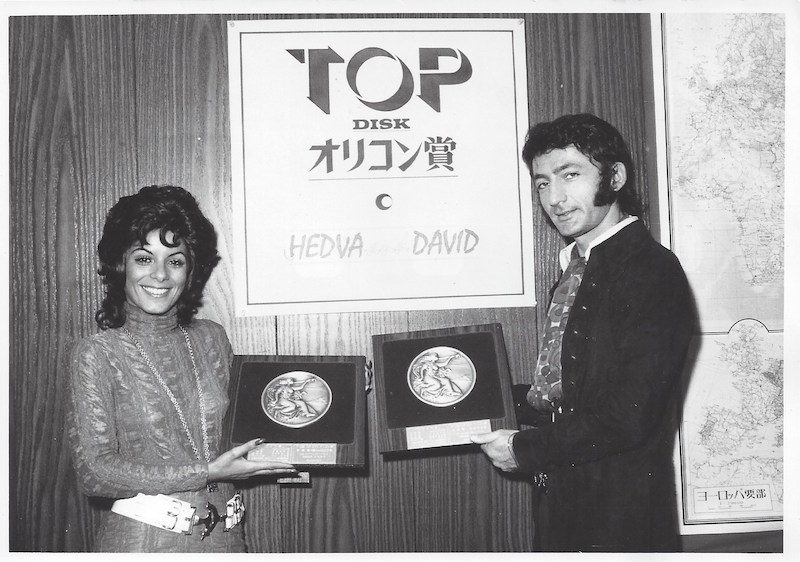
――― We would definitely like to have you here in Japan again. We know you are currently based in LA, but what is your favorite thing about Israel that you want to tell the Japanese audience?
Hedva ー A lot of things I love about Israel. So I said about the people of Japan how polite and nice, the Israeli could be the opposite of polite but very loud. On the other hand, they are so friendly. They are lively people. Japanese people are quiet and kept-in but for the Israeli, everything is out! They are not too shy. For example, when you are on line for something, they could not always be polite like Japanese people. But if you(and your car) get stuck on the road, they'd be the first one to come help you. If you get lost and really don't know where you are, they will help you. And if you fall in the street, they will help you. If you come to Israel and don't have any place to go for Shabat, they will invite you to their home. They are very family oriented. The thing I love most about Israel is the family time. Every Shabat which is from Friday night until the end of Saturday night, everybody gets together and enjoys the good time with the family. All the holidays are amazing, they are so festive. We have a beautiful country and there are many beautiful parts of Israel. You see gorgeous mountains and rivers. The sea water is warm and it's almost as warm as a sauna, it's amazing!
Speaking of Jerusalem, it is very holy and swats on the Judaean mountains. Tel Aviv is a vibrant city. It has the beach and it's like the city you never experienced..it's great for young people with many clubs and bars open all night. And there are a lot of museums and theaters, and the art there is wow! Big time. The food scene is also special in Israel. There are great chefs in Israel that are well-known internationally who own restaurants all over the world from New York to London, to Berlin to..just name it.
More places I like in Israel are the North and South part of the country. Beautiful areas. There are great hotels with Michelin stars, a lot of sailing boats, we love sailing here. And what else? A lot more but overall, Israel is a very friendly country. Young people love Israel. Israel welcomes all kids of people, LGBTQ and others. Israel has the biggest gay parade in the world, The Tel Aviv Pride. And people come here for it from all over the world. It’s amazing. I also performed for a gay pride 2 years ago. It was so exciting. Well that is Israel, so come visit!
――― Thank you, we definitely would love to. Lastly, can you give a short message to your Japanese fans?
Hedva ー First of all, in the days of this pandemic, I pray and I beg you all to keep yourself healthy and positive. I know it's very hard and depressing, even I feel depressed too as I don’t get to see my grandchildren. I’m very sad that they are far away and I cannot travel. As Americans, we can’t go anywhere outside of the country. All I can say is: Stay positive! Life is not so bad, sometimes we fall but always rise up. Please listen to my songs and be happy! I’d be so happy to see you all soon!
